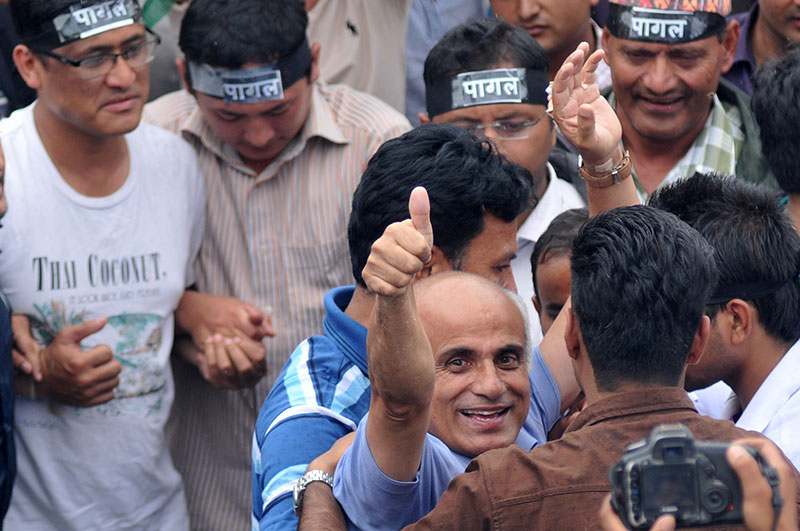
OR

A simple meeting to evaluate the prospects of a micro solar grid in Rolpa permanently reshaped my view. Politics, I saw, had percolated down to every strand of civilian life
This story starts in Jungar, a remote and under-developed VDC of Rolpa district. Home to just over a 1,000 household, Jungar is a picture-perfect postcard when it fits within the frame of a camera.
Nestled among rolling hills dotted with small and old houses, and with a village square flanked by colourful shops and eateries, Jungar is like many other places in Nepal—ideal for a brief visit but with no seeming prospect for imminent development, and not a place you would want to live.
The drive to Jungar was long, through treacherous roads and sharp turns. About 25 local community members had already assembled when we arrived for our meeting. We were there to assess the feasibility of a micro solar gird.
The meeting started, as they always do, with introductions. The first person got up and after providing his name, described himself as a functionary of a political party. The second person got up and after providing his name, also described himself as a functionary of another political party. This went on and on till the very last introduction.
Every community member belonged to some political party. Their political association defined their identity at the meeting. No one seemed to live there simply as ordinary Nepali citizens free of any political tag. It got worse as we conducted the survey. Every house was tagged as a Congress, Maoist or UML household.
A simple meeting to evaluate the prospects of a micro solar grid left me with an impression that would permanently reshape my view on Nepal: politics, I saw, had percolated down to every strand of civilian life.
On my return, I realized that Kathmandu was only a magnification of Jungar. The roads were less treacherous (though still bad), the houses bigger, electricity supply better, the commercial squares more abuzz. But politics had corrupted every strand of civilian life, perhaps more visibly and blatantly than in Jungar.
We are less a country of ordinary citizens and more of political opportunists. Where have all the citizens gone? And if there are no Nepalis left, why do we still have a Nepal?
In uncertain times with unsteady political leadership, it is always helpful to have political cover. This makes it easier to secure a job, win a contract, gain admission to a school or college, or just to get ahead. And if you don’t do it, someone else will; so, what the hell!
Today’s Nepal is no different. Political patronage is essential not just for success, it is essential for people’s very survival. Corruption and nepotism are widely accepted and deeply rooted in every area of our society, even within the most revered parts of our religions and the justice system.
The most worrisome part is that the decay has infiltrated our homes. Our moral compass has ceased to function. Lying, cheating, bribery—everything is acceptable because we have conveniently justified to ourselves that if we don’t do it, someone else will; so what the hell!
Every evening we converge around the family dinner table to berate our corrupt political leaders. The next day we go about our business—cutting corners, peddling influence for our friends, a half-truth here, a little lie there. Maybe it doesn’t strike us that we may have become just like the corrupt political leaders we look down on.
The lines between politics and civilian life are so blurred that it is hard to say whether the decay in politics is a reflection of the decay in civilian life, or vice-versa. And how do we clear this mess?
One option is to do what Dr Govinda KC did with his hunger strikes. In his tenth hunger strike, Dr KC successfully got the government to replace several key people at Tribhuvan University and the Institute of Medicine, with those that he found less corrupt and more suitable for the positions.
If Dr KC’s hunger strike gives him implicit authority to choose who gets which position, why isn’t he a politician? If he is a civilian, why does he get to dictate who gets which appointment? And if his appointments don’t produce the desired results, who will take the responsibility? Unlike the government, we can’t hold Dr KC to account.
Another option is to challenge the decision of politicians in court, as Advocate Om Prakash Aryal did against Lokman Singh Karki, the former chief of the Commission for Investigation of Abuse of Authority (CIAA). Four years into Karki’s appointment, the courts sided with Aryal’s petition and disqualified Karki, overriding a political negotiation that had installed Karki as CIAA chief.
The outcomes of Dr KC’s and Aryal’s struggles are false victories. While the results have reversed political decisions that may have had malicious intent, it further blurs the distinction between political and civilian life.
Odd as it may sound, the best way to rebuild civil society in Nepal is to step back from the temptation of politics. This involves not attempting to correct politicians—let politicians be politicians, even though many of them will continue to act on their narrow self-interest.
As civil society, we should not be making political decisions, for example, by judging who is fit for a position. Instead, our effort must go towards ensuring that those that were politically selected deliver on their promise.
For example, we shouldn’t waste our time second guessing Karki’s political appointment.
Our job as civility society is to ensure that once appointed Karki does his job well. This requires greater transparency from government, which we must fight for. It requires us to be actively engaged as a shadow government of civilians. But we shouldn’t fool ourselves into believing we can correct things by simply reversing self-interested political decisions.
As civil society, we need to work harder to protect our institutional space granted in the constitution. Across all agencies and institutions, civil society is given a seat at the table—typically at the highest level, for instance, at the board-level. We shouldn’t allow political interests to fill those seats with political cronies who echo the interest of politicians that put them there. We need to do more to regain the autonomy and sanctity of civilian space without being pulled into politics.
We can’t build a nation by eroding and undermining the institutions that make it. For good or bad, the political leadership we currently have is the only political leadership we have.
As civil society, we need to be able to rise above their decay, be their conscience and moral compass.
There is no easy way except as citizens “we all have to be the change that we want to see”.
Any time you feel inclined to cut a little corner, remember that the filth in the political system we keep complaining about is a reflection of the decay in our civilian lives.
Bishal_thapa@hotmail
You May Like This

Where has my tablet gone?
Back in 2010, tablet computers were in full bloom. Apple had announced their iPad and Samsung was working on their... Read More...

Infographics: Where Have US Women Served As Ambassadors?
Throughout history, most US ambassadors have been men. Since the beginning of U.S. diplomatic relations, 4,600 ambassadors have served abroad... Read More...

Nepalis traveling to India have to carry ID card
BAITADI, Aug 1: With security tightened by India at border areas in view of its Republic Day on August 15,... Read More...






Just In
- CM Kandel requests Finance Minister Pun to put Karnali province in priority in upcoming budget
- Australia reduces TR visa age limit and duration as it implements stricter regulations for foreign students
- Govt aims to surpass Rs 10 trillion GDP mark in next five years
- Govt appoints 77 Liaison Officers for mountain climbing management for spring season
- EC decides to permit public vehicles to operate freely on day of by-election
- Fugitive arrested after 26 years
- Indian Potash Ltd secures contract to bring 30,000 tons of urea within 107 days
- CAN adds four players to squad for T20 series against West Indies 'A'













Leave A Comment